

Towards a More Transformative Community Economic Development. By Ian Adelman, Emily Earle, and Penn Loh [Note: This article is based on Adelman and Earle's 2012 Masters Thesis for the Tufts Urban & Environmental Policy and Planning.
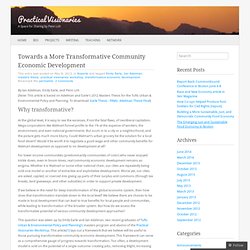
To download: Earle Thesis - FINAL Adelman Thesis Final] Why transformative? At the global level, it is easy to see the excesses, if not the fatal flaws, of neoliberal capitalism. Mega-corporations like Walmart funnel profits to the 1% at the expense of workers, the environment, and even national governments. But zoom in to a city or a neighborhood, and the picture gets much more blurry. For lower income communities (predominantly communities of color) who never enjoyed trickle down, even in boom times, real community economic development remains an enigma.
If we believe in the need for deep transformation of the global economic system, then how does that transformation translate down to the local level? Living Cities. Anchors Aweigh: Why Do Anchor Institutions Matter? - Cascade: No. 81, Fall 2012 - Philadelphia Fed. Home > Community Development > Community Development Publications & Videos > Cascade > No. 81, Fall 2012 By Prabal Chakrabarti, Vice President, Federal Reserve Bank of Boston In many cities, the expectation of civic leadership from a few large corporations headquartered downtown has ebbed.
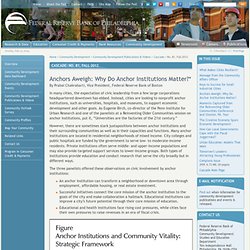
Instead, cities are looking to nonprofit anchor institutions, such as universities, hospitals, and museums, to support economic development and other goals. As Eugenie Birch, co-director of the Penn Institute for Urban Research and one of the panelists at a Reinventing Older Communities session on anchor institutions, put it, “Universities are the factories of the 21st century.” However, there are sometimes stark juxtapositions between anchor institutions and their surrounding communities as well as in their capacities and functions. The three panelists offered these observations on civic involvement by anchor institutions: Making a Big Impact Getting this right can be a powerful experience. Policy Development; Policy Section Bibliographies. Citizen Development.
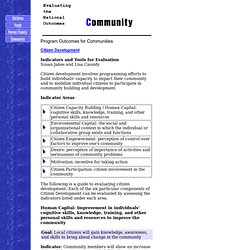
Oiling the wheels of community. Part 2 of my Five rules, Four principles, Three approaches, Two caveats and One request for social networks and community.
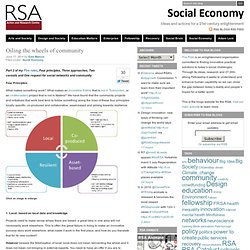
Four Principles: What makes something work? What makes an Incredible Edible that is not in Todmorden, or an UnMonastery project that is not in Matera? What is asset-based community-driven development (ABCD)? Asset-based community-driven development (ABCD), or just asset-based community development, is a bottom-up way of working with communities that focuses on community strengths and assets.
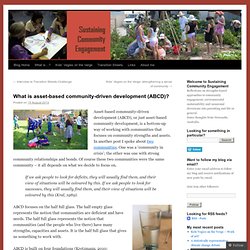
In another post I spoke about two communities. One was a ‘community in crisis’; the other was one with strong community relationships and bonds. Of course these two communities were the same community – it all depends on what we decide to focus on. If we ask people to look for deficits, they will usually find them, and their view of situations will be coloured by this. If we ask people to look for successes, they will usually find them, and their view of situations will be coloured by this (Kral, 1989).
ABCD focuses on the half full glass. ABCD is built on four foundations (Kretzmann, 2010; Kretzmann & McKnight, 1993; Mathie & Cunningham, 2003): 100 Resilient Cities - Rockefeller Foundation. Creative Community Fellows. We believe that arts and culture are vital to community life.
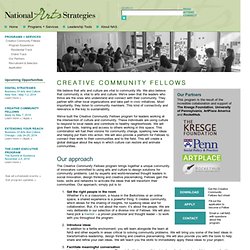
We also believe that community is vital to arts and culture. We've seen that the leaders who thrive are the ones who understand and connect with their community. W.K. Kellogg Foundation Evaluation Handbook. LIM/ “We were really impressed when we saw the tool.
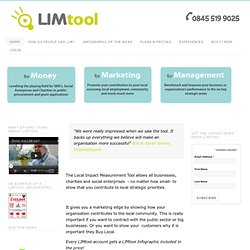
It backs up everything we believe will make an organisation more successful” Bob & Sarah Brown, Inspire2aspire. Jubilee Center - Home. Www.clusterobservatory.eu/system/modules/com.gridnine.opencms.modules.eco/providers/getpdf.jsp?uid=3513a34f-f505-4c84-ada4-5e45e1bd4e8c. The Accountability Lab. 9 Jan 2014 | Blair Glencorse | Social Innovation Imagine if you couldn’t receive health services from your government unless you paid a bribe which you could not afford.
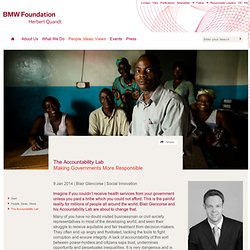
This is the painful reality for millions of people all around the world. Blair Glencorse and his Accountability Lab are about to change that. Many of you have no doubt visited businessman or civil society representatives in most of the developing world, and seen their struggle to receive equitable and fair treatment from decision-makers.
They often end up angry and frustrated, lacking the tools to fight corruption and ensure integrity. Video: Citizen Journalism in Liberia Accountability Lab The Accountability Lab is an incubator for the world’s most creative accountability ideas, located at the OpenGov Hub. Community Design Collaborative: Strengthening neighborhoods through design. The Plunkett Foundation - Home page. Transition Network. Asociacion Ciudades Kyosei / Pedro Prieto-Martin. Author Archive This week Avaaz, the “campaigning community bringing people-powered politics to decision-makers worldwide’, started the beta-testing of its community petitions platform, which allows anybody to launch a petition in a question of minutes.
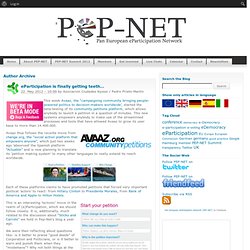
This new systems empowers anybody to make use of the streamlined processes and tools that have allowed Avaaz to grow its user base to more than 14.400.000. Avaaz thus follows the recente move from change.org, the “social action platform that empowers anyone”, which just two weeks ago ‘absorved’ the Spanish platform “Actuable” and is now planning to translate its ‘petition making system’ to many other languages to really extend its reach worldwide. Each of these platforms claims to have promoted petitions that forced very important political ‘actors’ to react: from Hillary Clinton to Presidente Morales, from Bank of America and Apple to Hilton Hotels.
It is a pitty, because these platforms are now out there, growing.
Coady. Igniting Leadership The Coady International Institute ignites leadership that inspires collaborative effort to address challenges, discover opportunities and create sustainable development at the community level.
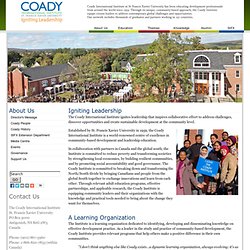
Established by St. Francis Xavier University in 1959, the Coady International Institute is a world-renowned centre of excellence in community-based development and leadership education. In collaboration with partners in Canada and the global south, the Institute is committed to reduce poverty and transforming societies by strengthening local economies, by building resilient communities, and by promoting social accountability and good governance.
19.7.1 Levels of community participation - Health Education, Advocacy and Community Mobilization HEAT Module. All participation is not equal. The extent of participation in programmes can vary from minimal to complete ownership. Figure 19.9 shows increasing degrees of participation from the low end of co-option to the upper end of collective action. 우리는 책임있는 기업에 대해 서. Future Communities. BALLE - Business Alliance for Local Living Economies. COPIE - The Community of Practice on Inclusive Entrepreneurship. Shelterforce - National Housing Institute. Cdf.org.uk. CRC Research. Home - Abundant Community. Search Local Businesses, Buy Local, and Join IWS. Institute for Local Self-Reliance. Grants - My Community Rights. The Social Investment Business runs the Community assets and services grants programme made available by DCLG for organisations wanting to take over the ownership or management of a local building or land of community value.
What Is The LEAP Community Hub?